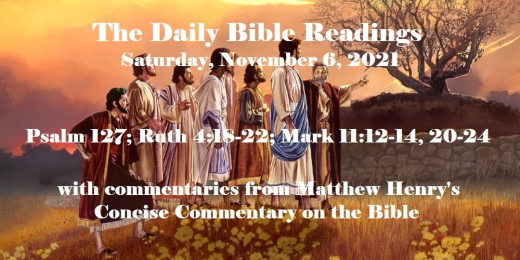Saturday, November 6, 2021
Psalm 127; Ruth 4:18-22; Mark 11:12-14, 20-24
with commentaries from Matthew Henry's Concise Commentary on the Bible
Introduction
Today’s Verse of the Day:
Ephesians 1:9-10
He made known to us the mystery of his will according to his good pleasure, which he purposed in Christ, to be put into effect when the times reach their fulfillment—to bring unity to all things in heaven and on earth under Christ.We have no idea all that God wants to do in and through us. In our limited understanding, we have yet to imagine what is possible for us—the intimacy with the Lord, power, freedom, spiritual blessings, and peace that belong to us when we become His children (Eph. 1). But God—who is perfect in His knowledge and wisdom—does. And His Holy Spirit, who indwells us from the moment of our salvation, reveals the depths of His purpose and plan to us through His Word when we seek Him.
Today’s Lectionary Readings:
From the Psalter
Psalm 127
Children a Heritage from the Lord
the builders labor in vain.
Unless the Lord watches over the city,
the guards stand watch in vain.
2 In vain you rise early
and stay up late,
toiling for food to eat—
for he grants sleep to those he loves.
3 Children are a heritage from the Lord,
offspring a reward from him.
4 Like arrows in the hands of a warrior
are children born in one’s youth.
5 Blessed is the man
whose quiver is full of them.
They will not be put to shame
when they contend with their opponents in court.
Commentary
From the Historical Books
Ruth 4:18-22
Ruth the Ancestor of King David
Perez was the father of Hezron,
19 Hezron the father of Ram,
Ram the father of Amminadab,
20 Amminadab the father of Nahshon,
Nahshon the father of Salmon,
21 Salmon the father of Boaz,
Boaz the father of Obed,
22 Obed the father of Jesse,
and Jesse the father of David.
Commentary
From the Gospels
Mark 11:12-14, 20-24
Condemnation and Blessing
20 In the morning, as they went along, they saw the fig tree withered from the roots. 21 Peter remembered and said to Jesus, “Rabbi, look! The fig tree you cursed has withered!”
22 “Have faith in God,” Jesus answered. 23 “Truly I tell you, if anyone says to this mountain, ‘Go, throw yourself into the sea,’ and does not doubt in their heart but believes that what they say will happen, it will be done for them. 24 Therefore I tell you, whatever you ask for in prayer, believe that you have received it, and it will be yours.
Commentary
Verses 20-24: The disciples could not think why that fig-tree should so soon wither away; but all wither who reject Christ; it represented the state of the Jewish church. We should rest in no religion that does not make us fruitful in good works. Christ taught them from hence to pray in faith. It may be applied to that mighty faith with which all true Christians are endued, and which does wonders in spiritual things. It justifies us, and so removes mountains of guilt, never to rise up in judgment against us. It purifies the heart, and so removes mountains of corruption, and makes them plain before the grace of God.
Today’s Lectionary Readings are selected from the Revised Common Lectionary Daily Readings, a three-year cyclical lectionary. We are currently in Year B. Beginning with the first Sunday of Advent in 2021, we will be in Year C. The year which ended at Advent 2020 was Year A. These readings complement the Sunday and festival readings: Thursday through Saturday readings help prepare the reader for the Sunday ahead; Monday through Wednesday readings help the reader reflect and digest what they heard in worship. Revised Common Lectionary Daily Readings, copyright © 2005 Consultation on Common Texts. www.commontexts.org.
The Bible texts of the Old Testament, Epistle, and Gospel lessons are from The Holy Bible, New International Version®, NIV® Copyright ©1973, 1978, 1984, 2011 by Biblica, Inc.® Used by permission. All rights reserved worldwide.
Commentaries from Matthew Henry's Concise Commentary on the Bible.





 LISTEN ONLINE
LISTEN ONLINE